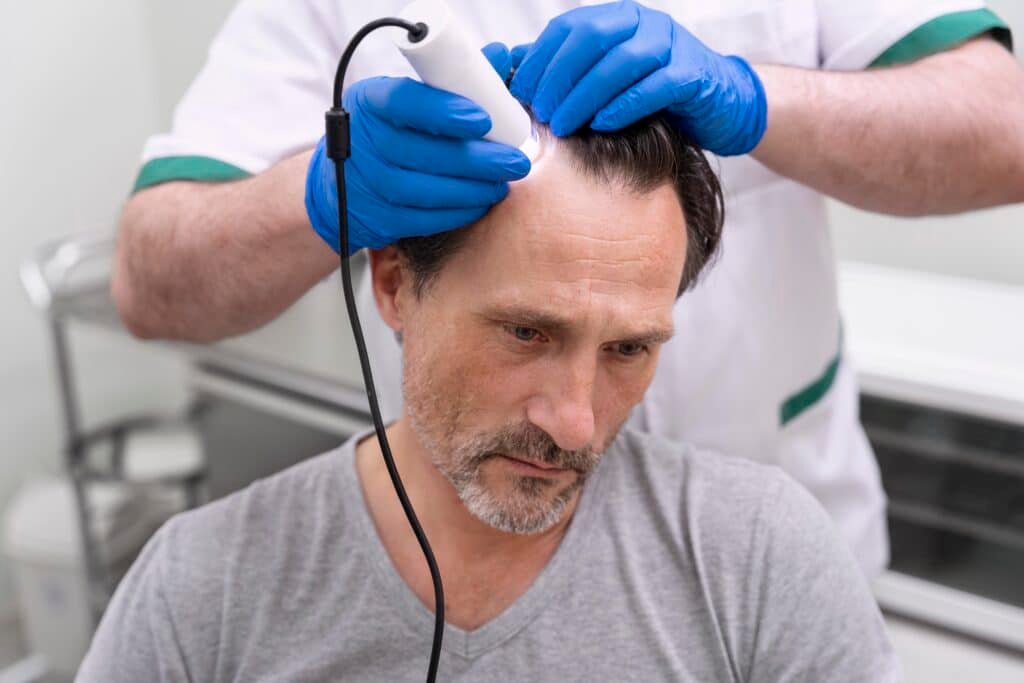
Hair transplantation is one of the most advanced and effective solutions for treating hair loss, especially when other treatments have not yielded satisfactory results. However, many patients who undergo the procedure are concerned when they notice hair loss a few weeks after the transplant. This phase is known as “Shock Loss” and, although it is often misinterpreted as a failure of the surgery, it is actually a completely normal and temporary stage of the hair healing and regrowth process.
What is “Shock Loss”?
Simply put, “Shock Loss” is the sudden, temporary loss of hair that occurs in an area that has undergone a transplant. This hair loss can involve:
- The transplanted hair follicles, that is, the hairs that were implanted,
- Pre-existing natural hair around the area of the procedure, especially if it is weak or sensitized.
This phenomenon can begin approximately 2–8 weeks after transplantation and last for a few weeks, causing intense concern in many patients, especially if they are not adequately informed.
Why Does “Shock Loss” Happen?
The explanation is purely biological and has to do with the body’s response to trauma. When a hair transplant is performed, the scalp undergoes a kind of surgical microtrauma. The hair follicles (both new and existing) may enter the so-called “telogen phase”, i.e. the resting phase, during which the hair temporarily stops growing and eventually falls out.
Factors contributing to “Shock Loss” include:
- Surgical trauma during the extraction and implantation of hair follicles,
- Changes in the microcirculation of the area,
- Stress of the body, locally and systematically,
- Inflammatory reaction from the immune system.
Who is more susceptible to “Shock Loss”?
Although all patients have a chance of experiencing “Shock Loss”, there are specific groups that are more prone to the phenomenon:
- People with thin or weak hair in the recipient area.
- Patients undergoing transplantation of existing hair growth, e.g., for density.
- People with a history of diffuse alopecia or sensitivity to stress.
- Female patients, in whom diffuse hair loss is more common.
- Very young patients, where the hair around the implant is even more sensitive.
Is “Shock Loss” Permanent?
No. “Shock Loss” is temporary. Although hair loss may seem alarming, the hair follicle remains active and is simply “resting.” Hair will begin to grow back in 3–4 months, while full growth and the final aesthetic result is usually completed within 8–12 months.
What matters is the health of the hair follicle itself, not whether the hair falls out in the first place.
What Can You Do?
The best approach for “Shock Loss” is:
1. Good information before the operation
An experienced dermatologist will prepare you psychologically for what to expect.
2. Follow the postoperative instructions closely
- Use the shampoos and preparations that will be given to you.
- Avoid rubbing, massaging, or pulling on the implant area.
- Avoid exposure to strong sunlight or high temperatures (e.g. sauna) in the first few weeks.
3. Patience and composure
“Shock Loss” does not mean transplant failure. It is a stage. Many times, it is necessary for the regeneration phase to begin.
4. Supplementary support
- In some cases, the doctor may recommend topical use of minoxidil or other hair growth stimulants.
- Supplements such as biotin, zinc, and vitamin D may help, after medical evaluation.
When you should Worry?
“Shock Loss” is almost always harmless and expected. However, in rare cases, prolonged or extensive hair loss may occur. If you notice:
- Loss after the 3rd month without signs of regrowth,
- Severe pain, redness or inflammation,
- Loss in areas that were not operated on,
then it is best to contact your dermatologist immediately.
Conclusion
The “Shock Loss” stage is a natural, temporary and treatable part of the hair transplant process. As stressful as it may seem, it is actually a biological “reset” that prepares the ground for healthier, stronger hair. With proper guidance, patience and adequate information, most patients go through this stage smoothly and enjoy impressive results in the months that follow.
Book your appointment today at the dermatology clinic in Glyfada for a personalized diagnosis | dermatologist Glyfada




